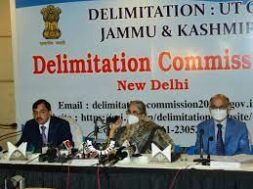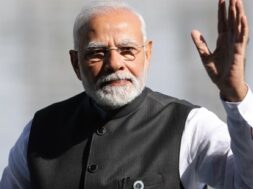
J&K Delimitation Commission: Six Seats Added to Jammu, one to Kashmir Valley, “Not Acceptable,” Say Regional Parties
Manas Dasgupta
NEW DELHI, Dec 20: All the regional parties in Jammu and Kashmir are up in arms against the recommendations of the
Delimitation Commission adding six Assembly seats to the Jammu region and only one to the Kashmir valley.
With this, the number of Assembly seats in the Jammu region go up to 43 and in the Kashmir valley to 47 while 24 seats are expected to remain in Pakistan-occupied Kashmir as per a draft proposal discussed during its meeting in New Delhi on Monday with the associate members. Of the total, nine seats have been proposed to be reserved for STs and seven for SCs in Jammu and Kashmir, in its first paper drafted by the Commission.
The commission on Monday called five Jammu and Kashmir MPs, including National Conference’s (NC) Farooq Abdullah, M Akbar Lone and Hasnain Masoodi, BJP’s spokesperson for J&K Jitendra Singh and BJP’s Jugal Kishore Sharma. It has asked the associate members to submit their suggestions by the end of December.
Contrary to the claims of the union minister that all the political parties and the associate members appreciated the proposals of the commission, leaders of all the regional parties raised strong objections to the suggestions calling the commission the BJP agent to fulfill the central ruling parties political agenda to hoist a government in the state by all means to legitimize its decision abrogating article 370 implemented two years ago.
“The Commission has come out with a document that is objectively prepared. All associated members, regardless of party, appreciated the work done by the Delimitation Commission. NC members were also satisfied by parameters followed by the Commission,” Union Minister Jitendra Singh told the press after the conclave.
Soon after Singh’s claims, the NC vice-president and former chief minister Omar Abdullah said the draft recommendation of the commission was unacceptable. “The draft recommendation of the J&K delimitation commission is unacceptable. The distribution of newly created assembly constituencies with 6 going to Jammu & only 1 to Kashmir is not justified by the data of the 2011 census,” he tweeted. “It is deeply disappointing that the commission appears to have allowed the political agenda of the BJP to dictate its recommendations rather than the data which should have been its only consideration. Contrary to the promised “scientific approach” it’s a political approach,” the NC leader added.
The NC MP Hasnain Masoodi, who attended the meeting, termed the proposal “unacceptable”. “It is a matter of concern. We will submit our report in detail very soon, as the proposal is not acceptable at all,” he said.
Sounding similar objections, the People’s Democratic Party (PDP) president Mehbooba Mufti tweeted: “My apprehensions about the Delimitation Commission weren’t misplaced. They want to pitch people against each other by ignoring the population census & proposing six seats for one region & only one for Kashmir. This commission has been created simply to serve BJPs political interests by dividing people along religious & regional lines. The real game plan is to install a government in J&K which will legitimise the illegal and unconstitutional decisions of August 2019.”
The Jammu and Kashmir Apni Party (JKAP) also rejected the panel’s proposal. “J&K Apni Party rejects the proposal of the delimitation commission. This is outrightly unacceptable to us. Apni Party demands a fair delimitation exercise without any bias, taking population and districts as the base. We strongly demand the GoI to intervene,” it tweeted.
Sajad Lone, who heads the Peoples Conference, said, “The recommendations of the delimitation commission are totally unacceptable. They reek of bias. What a shock for those who believe in democracy”.
Delimitation is the act of redrawing the boundaries of an Assembly or Lok Sabha seat to represent changes in population over time. This exercise is carried out by a Delimitation Commission, whose orders have the force of law and cannot be questioned before any court. The objective is to redraw boundaries (based on the data of the last Census) in such a way so that the population under all seats, as far as practicable, is the same throughout the state. Aside from changing the limits of a constituency, the process may also result in changes in the number of seats in a state.
After the abrogation of Jammu and Kashmir’s special status in 2019, the government set up the three-member Delimitation Commission on on March 6, 2020, specifically for J&K by virtue of the Parliament Act under the provisions of Part V of J&K Reorganization Act, 2019 and its term will end in March next. The commission was headed by retired Supreme Court judge Ranjana Prakash Desai. Apart from Desai, Election Commissioner Sushil Chandra and J&K State Election Commissioner K K Sharma are the ex-officio members of the delimitation panel. The panel also has five associate members — National Conference MPs Farooq Abdullah, Mohammad Akbar Lone and Hasnain Masoodi, Union Minister of State in the Prime Minister’s Office Dr Jitendra Singh and Jugal Kishore Sharma of the BJP.
Although the Commission was tasked with finishing the delimitation in a year, it was granted a year’s extension on March 4 this year after the panel members said they couldn’t make much progress due to the Covid-induced lockdown across the country.
According to the mandate of the commission, the delimitation exercise was based on the 2011 census and population is the sole criteria for redrawing assembly seats. According to the 2011 census, Kashmir has 15 lakh more population than Jammu – 68.8 lakh vs 53.5 lakh.
In the erstwhile state assembly, Jammu province had 37 seats, Kashmir 46 seats and Ladakh 4 seats. Now, as per the draft proposal, Kashmir will have 47 seats and Jammu 43. And once the delimitation exercise carves out new assembly constituencies, seats in Kashmir will have a population ratio of 1.46 lakh against 1.25 lakh in Jammu province.
Five MPs from Jammu and Kashmir are associate members, but their recommendations are not binding on the Commission. Three National Conference MPs, including Farooq Abdullah, had boycotted meetings of the Delimitation Commission.
They have indicated that they will join the meetings if the chairman of the Commission addresses their concerns, since a case is pending before the Supreme Court. The National Conference and other parties have challenged the August 5 decision and the delimitation exercise before the Supreme Court.
As per the Jammu and Kashmir Reorganisation Bill, the number of Assembly seats in J&K would increase from 107 to 114, which is expected to benefit the Jammu region.
J&K will have a 90-member Legislative Assembly now, up from 87 prior to the Centre’s decision to end J&K’s special constitutional position.
Until it lost its special status, the delimitation of Jammu and Kashmir’s Lok Sabha seats was governed by the Constitution of India and that of assembly seats, by the Jammu and Kashmir Constitution and Jammu and Kashmir Representation of the People Act, 1957. The last redrawing was in 1995 and based on the 1981 census. There was no census in the state in 1991. And after the 2001 census, the J&K assembly passed a law putting on hold delimitation till 2026.
Since the delimitation is based on the census, several groups in Jammu have been strongly opposing delimitation based on the 2011 census. Per the 2011 census, Kashmir’s population is over 68 lakh against 53 lakh in Jammu. This means Kashmir will get more seats in terms of the population ratio.
The last delimitation in J&K was held in 1994-1995 when the former state was under President’s Rule; the number of seats in the J&K assembly was increased from 76 to 87. Seats in Jammu went up from 32 to 37 and in Kashmir, from 42 to 46 seats.













